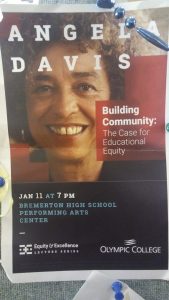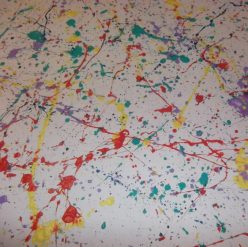
I didn’t get a chance this week to get in touch with my internship supervisor because they had a family emergency the day I was supposed to meet with them and I haven’t been able to reschedule that meeting yet, so my activities for that internship haven’t started yet.
This week I read an interesting article about how to learn to write good questions, by the author of our book Racial Indigestion, Kyla Wazana Tompkins. It was called We Aren’t Here to Learn What We Already Know. One thing I found really interesting about reading that was the concept of thinking about the history of where our questions come from. In other words to keep a kind of mental track of each question you write down developed. What did it spark from? Has it been changed, and why? How did you decide to change it? What are you going to use the question you’re creating for?
This idea of keeping track of how question develop is really cool to me, because I feel like it allows for a deeper process of coming up with that question and understanding what it takes to answer it, or expand on it, or whatever needs to be done with that question. It relates to an exercise I do sometimes, without much conscious thought, when I notice that my mind has wandered to a strange place. I back trace each of the topics and things that lead my train of thought to wherever it was when I stopped to trace back. It gives me a better idea of how my mind works in each particular circumstance, and I think that tracing the origin and development of question in a similar way can help you better determine how you’re understanding the information you’re forming questions about.
This discussion of the type of question that was best sounded very much like the form of question that many professors at Evergreen want to see on their seminar response papers, so it felt very close to home.
The day before my twentieth birthday I went up to Bremerton to see Angela Davis speak, an event put on by Olympic College in the gym at the highschool. The event was titled: Building Community: The case for Educational Equity.
It was an amazing experience because so much of the things she spoke about and so many of the conclusions she drew were the same things I was interested in learning, the same things I wanted to work on, and the same things I’ve been learning here at Evergreen, only put together and arranged in a really beautiful way. She spoke about the links between education and activism, and the mistake so often made of considering the separation of topics. That many times we separate topics to study them, such as in a traditional college curriculum, but that that separation is not true to the rest of the world outside of the analysis of those topics. She spoke about critically questioning the things we take most for granted as necessary for gaining a deeper understanding of the world around us and the ways to take down the structures of oppression in that world.
She spoke about the difference of what she called carceral feminism versus abolitionist feminism. In the former, the problem is solved when the perpetrator of violence or injustice is sent to prison. Whereas in abolitionist feminism the problem is closer to being solved when the cultural and societal reasons behind that act of violence are examined and removed.
It was really cool to see her speak, because it feels really rare to me that you get to see powerful women whose voices can fill a room and command attention speak. I’ve had a few such experiences at Evergreen lectures, and I’ve met a few women with that kind of presence, but only a few. The power and strength I see in the woman that are most around me is different in a way I haven’t figured out how to describe. Because it’s definitely there, but in a much different way.
Thinking about that me think about the things I’ve learned about representation in media. Most of the time when I think about that subject it’s in the terms of getting better representation for trans and queer people and people of color. But I rarely think about the lack of different types of strength in women represented in media. And how even though there is a lot of representation of, at least of white, women in media, there is still not the kind of representation that I myself long for. I don’t know that I want to, or need to, see this kind of representation until I’m confronted with the kind of powerful speaker that Angela Davis is, or that Dr. Maxine Mimms is. And I realize how much I would love to see more of that kind of speaker, to have more of those kind of women around me.
